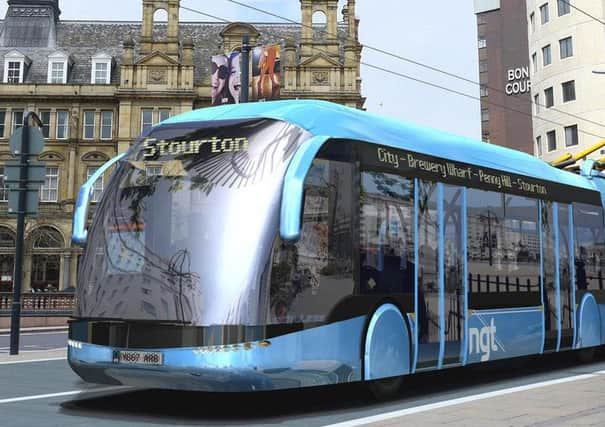Leeds trolleybus spending hits £5m ahead of inquiry


Figures released following a request under the Freedom of Information Act show a total of £4.9m has been ploughed into the New Generation Transport (NGT) project by its co-promoters, Leeds City Council and West Yorkshire passenger transport authority Metro.
A breakdown of the outlay shows around £3.9m of the cash has gone on what are described as “consultants fees”.
Advertisement
Hide AdAdvertisement
Hide AdAnother £900,000 has been paid out on promoter salaries while around £131,000 was used for printing, office supply, travel and accommodation costs.
The £5m total is separate to the estimated £40m that was spent on the ultimately-unsuccessful plans for a Supertram light rail system in Leeds.
The new figure has emerged amid continuing preparations for the public inquiry that will make or break the city’s trolleybus proposals.
Expected to get under way in the spring, the inquiry’s findings will be used by the Government as it decides whether to grant Leeds the Transport Works Act (TWA) Order it needs to build and operate the system.
Advertisement
Hide AdAdvertisement
Hide AdShould the city’s TWA Order application be turned down, then the £173.5m set aside for the scheme by the Department for Transport (DfT) when it initially got the green light in 2012 would be withdrawn.
The cash spent to date by the council and Metro, meanwhile, would be lost. Their £5m outlay is part of the £77m that will end up being contributed by the two promoters if the project secures its TWA Order and makes the leap from the drawing board to the streets of Leeds.
A Metro spokesman yesterday said an “extremely detailed level of planning” had been required for the scheme. He went on: “The amount already spent by Leeds City Council and Metro on NGT, which has gained DfT approval and been described by independent inspectors as being at ‘the cutting edge of transport provision’, is part of the scheme’s overall £250m budget and is in line with the preparation costs of other UK transport projects.
“If this scheme does not go ahead, this £5m will be lost along with the £173.5m of Government investment and all the opportunity this first stage of NGT will bring to the local economy, but it will not be because we have under-prepared.
Advertisement
Hide AdAdvertisement
Hide Ad“Developing a completely new scheme now, as some opponents of the NGT scheme have proposed, would mean this initial expenditure would be forfeited as well as the £173.5m investment in our transport system and economy being lost.”
Leeds’s trolleybus plans were drawn up after the then Labour government scrapped Supertram in 2005 due to concerns about rising costs.
Powered electrically by overhead wires, the scheme would link Holt Park in the north of the city with Stourton in the south.
If Leeds secures its TWA Order, then construction work would begin in 2017 or 2018.
Advertisement
Hide AdAdvertisement
Hide AdAround 3,000 business and domestic properties could be affected by the work.
NGT bosses say the system would create up to 4,000 permanent new jobs and generate about £175m per year for the Leeds economy.
Opponents claim the project would offer poor value for money while damaging the environment and people’s quality of life. Leeds East MP George Mudie has branded it “unglamorous”.
The forthcoming public inquiry could last around two months – and, once completed, it may still take another year for the Government to make a final decision on the TWA Order application.